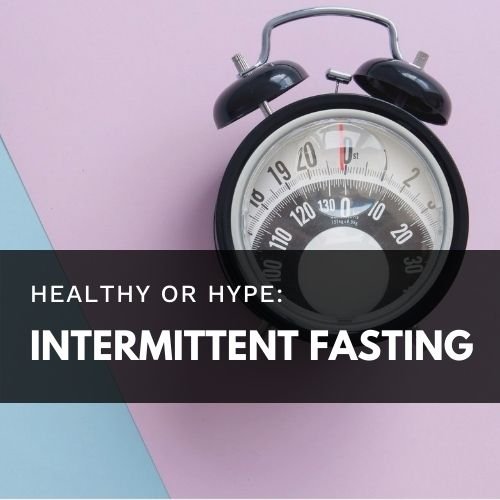shop
learn

Healthy or Hype: Intermittent Fasting
June 11, 2024 4 min read
Intermittent fasting (IF) is a popular health trend that is claimed to provide several health benefits.
Some studies have found it to be beneficial for things like weight loss, insulin resistance, heart health, and protecting against certain diseases (1).
So, should you try it?
This article will talk about what intermittent fasting is, the different methods of doing it, benefits and cons of this way of eating, and a dietitian’s perspective on it.

What is Intermittent Fasting?
Intermittent fasting is a type of eating pattern that alternates between fasting and eating.
Unlike other diets, it focuses more on when to eat versus what to eat.
With almost half of the U.S. population classified as obese, focusing better attention on eating patterns is crucial for overall health (2).
Intermittent Fasting Methods:
There’s several different methods of intermittent fasting including:
- 16/8 method: Includes fasting for 16 hours and having an 8 hour window for eating.
- Alternate day method: Alternatives between a fasting day and eating day throughout the week.
- The Warrior method: Involves eating very little during the day, and feasting on one huge meal at night.
- Skipping meals: As the name describes, this method involves skipping meals on occasion.
Benefits of Intermittent Fasting:
Several studies have found intermittent fasting to be beneficial for health in a variety of ways. Some of those benefits include:
1. May Help Improve Insulin Resistance:
Insulin resistance is a condition in which the cells don’t respond well to the hormone insulin, which results in a buildup of glucose in the blood. This can increase the risk for developed health conditions.
Some studies have shown fasting to help reduce insulin resistance, along with a reduction in fasting insulin levels (3, 4, 5).
2. May Improve Cardiovascular Health
One small study found a reduction in total cholesterol, LDL cholesterol, and triglyceride levels among those who followed an alternate-day fasting method.
Researchers concluded that fasting may be a helpful option for those trying to lose weight and decrease heart health risk (6).
3. May Help Reduce Stress and Inflammation
Another benefit of fasting is that it can help reduce stress and inflammation in the body.
For instance, one study found a reduction in stress and inflammation in asthma patients who followed an alternate day calorie restriction fasting regime (7).
Another study found c-reactive protein levels (a lab value that indicates inflammation levels in the body) to significantly decrease for those participating in Ramadan (8).
4. May Help with Weight Loss
A popular claim for IF is that it’s helpful for weight loss, and studies have shown it to be beneficial for this (9, 10).
One reason is because fasting can help the body burn fat for fuel instead of utilizing carbohydrates (11).
Another reason is that having a constricted eating window generally leads to less caloric intake overall (12).
Additionally, one study found intermittent fasting to cause less muscle loss compared to calorie restricted diets, which can also be helpful for weight loss (13).
Cons of Intermittent Fasting:
Although there’s some benefits of intermittent fasting, there’s also several cons. Those include:
1. It’s Restrictive:
Having specific timeframes for eating can feel restrictive and actually increase the desire to eat.
For example, one study found that participants who followed a fasting regimen reported higher hunger scores compared to those who didn’t fast (14).
Additionally, it may be difficult to get enough calories or nutrients on a limited eating schedule. In that case, incorporating a daily multivitamin such as our Essentially-U may be helpful.
2. Not Appropriate for Everyone:
Fasting is not appropriate for everyone, especially those who are pregnant, breastfeeding, have a history of disordered eating, already have nutrient deficiencies, or are on certain medications.
It can also be harmful for those under stress or not getting enough sleep at night, since intermittent fasting can increase cortisol levels in the body (15).
Additionally, it should be done under medical supervision for someone with insulin resistance or other medical conditions (16).
4. May be More Beneficial for Men Vs. Women:
Intermittent fasting may be a better tool for men versus women.
For instance, one study found fasting to negatively impact glucose tolerance for women but not men (17).
Additionally, studies have found calorie restriction to have a negative impact on areas such as fertility and bone health for women (18, 19).
Should You Try Intermittent Fasting? My Verdict:
So since fasting can provide several health benefits, should you try it?
My answer is, it depends on the person.
For some, it may seem like another form of dieting and feel highly restrictive; especially for those with a history of disordered eating.
On the other hand, for some it may be a helpful tool for preventing overeating throughout the day, and aid in weight loss.
If you want to try intermittent fasting, I’d suggest focusing on a time-restricted method, and start with a 12 or 14 hour fast overnight first to see how it feels.
Additionally, make sure to focus on incorporating nutrient-dense foods during your eating schedule, and consult with a healthcare professional first before making any drastic changes to your health.

Leave a comment
Comments will be approved before showing up.
Also in Health
Subscribe
Sign up to get the latest on sales, new releases and more …
Join the Utzy Naturals Club!
Sign up and get the latest on sales, new releases, and more...






